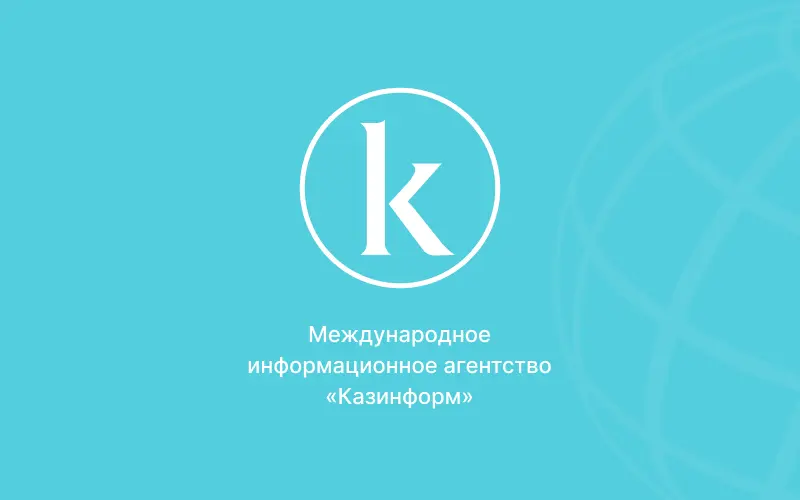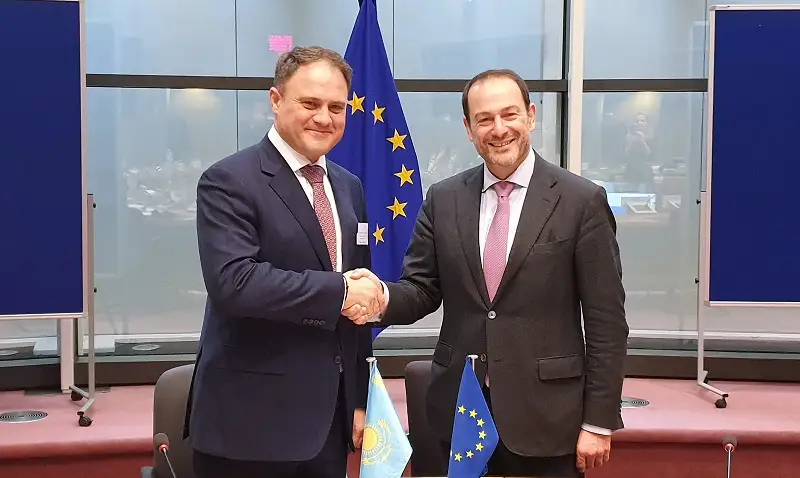Kazakhstan and EU: intensive political dialogue and broad prospects for enhanced trade relations, active investment

The Kazakhstan delegation, which included representatives of the Ministries of Foreign Affairs, National Economy, Energy, the National Security Committee and the General Prosecutor's Office, was headed by Deputy Minister of Foreign Affairs of Kazakhstan Roman Vassilenko. The European delegation was headed by Deputy Managing Director, Director for Russia, Eastern Partnership, Central Asia and the OSCE of the European External Action Service, Luc Devigne.
During the meeting, the parties reviewed the full range of issues in bilateral relations between Kazakhstan and the EU, including areas of political, trade and economic cooperation, as well as interaction in the «Central Asia - European Union» format.
Mr Vassilenko, in his speech, noted that in December last year, additional responsibilities to attract foreign investment and promote Kazakhstan's exports abroad were given to the Ministry of Foreign Affairs of Kazakhstan. In this regard, the role of one of the key illustrations of the dynamic development of cooperation between Kazakhstan and the EU - signing of the Enhanced Partnership and Cooperation Agreement (EPCA) in 2015 - is especially growing. "Amid strengthening the economic component of the foreign policy, Kazakhstan has high hopes for the Enhanced Partnership and Cooperation Agreement with the European Union, which allows to significantly increase the volume of trade and investment, primarily through high-tech industries, to generate new opportunities for economic growth and job creation," Mr Vassilenko said.
During the negotiations, the parties agreed to develop a roadmap for the implementation of the EPCA in order to ensure its most effective implementation on both sides. Today, the EPCA, which is designed to raise cooperation between Kazakhstan and the EU to a new level and cover 29 areas of cooperation, has already been ratified by 25 out of 28 EU member states, as well as by the EU legislative body - the European Parliament.
A number of significant events that gave an impetus to bilateral relations were noted, including the participation of President of Kazakhstan Nursultan Nazarbayev in the ASEM summit in 2018 in Brussels and his meeting with the President of European Commission Jean-Claude Juncker.
The parties also paid special attention to the issue of strengthening trade, economic and investment cooperation, which are considered priority areas. The parties confirmed their interest in deepening comprehensive ties in the fields of energy, transport, environment, education, science, and the development of civil society.
The broad agenda of the meeting also included interaction in the areas of the rule of law, the protection of human rights, visa facilitation and cooperation within the OSCE. The Deputy Foreign Minister noted that "Kazakhstan attaches great importance to our cooperation with the European Union in the field of democratization, ensuring the rule of law and human rights, and highly appreciate the EU's many years of experience in this field".
A separate point of discussion was regional cooperation "European Union-Central Asia", which Kazakhstan fully supports and considers as one of the additional tools to ensure the sustainable development of the country and the region as a whole. Mr Vassilenko stressed that the new EU Strategy for Central Asia, the adoption of which is scheduled for this summer, will become a solid and multifunctional foundation for strategic cooperation between the regions.
The Kazakh diplomat also noted that Kazakhstan fully supports international and regional cooperation in the fight against illicit drug trafficking. "We highly appreciate and fully support all relevant ongoing activities by international and regional organisations. As part of the efforts to combat drug trafficking, it is essential to support Central Asian Regional Information Coordination Centre (CARICC), which for the last 10 years since its establishment has achieved major success, as the region's only effective information coordination structure to combat drug trafficking", the Deputy Minister said.
On the same day, the Kazakh delegation, representatives of the European External Action Service, the European expert community, the media, as well as members of the European Parliament participated in the discussion "EU - Kazakhstan relations: from security issues to regional cooperation", organized by one of the leading European media agencies, Euractiv .
During the discussion, a constructive dialogue took place on bilateral and regional cooperation, as well as international issues. In particular, the international initiatives of the Head of State, the implementation of the EPCA, the EU Strategy for Central Asia, the situation in Afghanistan, cooperation in the EU-EAEU format, the conjugation of the Kazakhstan program Nurly Zhol and the Chinese initiative Belt and Road were discussed.
Mr Devigne noted that relations between Kazakhstan and the European Union are indeed at a high level, and "we have common objectives both on the bilateral and on the regional agenda". He also noted that the EU seeks to play a constructive role for Central Asia.
MEPs Iveta Grigule and Andrejs Mamikins agreed that the active foreign policy of the Head of State makes Kazakhstan a prominent actor at the international level and allows maintaining constructive relations with all global players. The role of Kazakhstan in maintaining global and regional security, the contribution to the non-proliferation of nuclear weapons, as well as peacekeeping in Afghanistan, including within the framework of the country's effective membership in the UN Security Council in 2017-2018, was noted.
